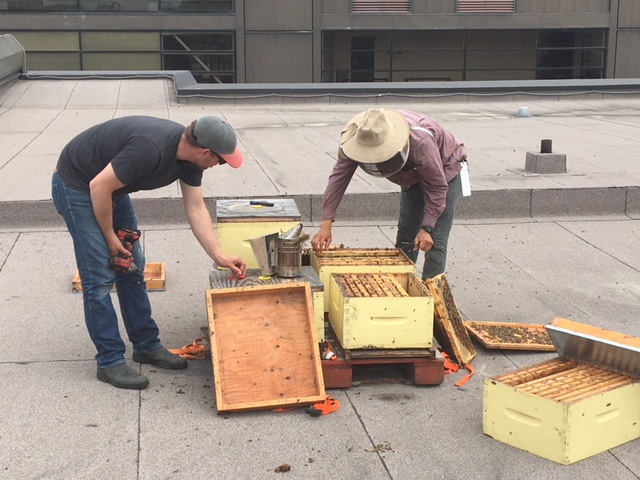The cold winter and spring in Manitoba has had an impact on local beekeepers, and that could have an effect on farm yields.

Last week Global News reported that Saskatchewan has experienced their worst beekeeping season in the province’s history due to cold temperatures late in the winter season.
Manitoba is facing similar challenges.
Manitoba Agricultural said the average loss in the honey bee populations is 15-25 per cent from over the winter. They estimate that number will almost double this year, at 30-40 per cent loss.
Chris Kirouac, co-founder of Beeproject Apiaries, said he’s already seeing a big loss from his hives across the city, most of which are in the downtown core.
“The number of losses were quite a bit higher than a typical winter for us,” Kirouac said Thursday while checking his hives at the University of Winnipeg and The Forks.
“In this case we are looking at the really harsh winter that we had, and the cold and long spring where it took a long time for the warmth to come.”
RELATED: Health Canada wants to phase out pesticides to save the bees
He said the hope for most beekeepers is to only lose about 10 per cent of their bees. Once that number climbs, they have to take extra measures to get the population back up.
“A beekeeper can do things like split strong hives in half to make extra hives and introduce a new queen, and that will increase the numbers and get you back to your pre-winter numbers. But once you lose more than 30 per cent, overall you experience a reduction in the number of colonies in Manitoba that you just can’t rebound to in one season.”
Kirouac said recovery can be a two to three year process for some beekeepers.
He hopes to have 70 hives through out the city this summer.
Urban beekeeping became legal in all areas of Winnipeg last year.
READ MORE: City-wide beekeeping in Winnipeg could soon become a reality
Daryl Wright, a rural beekeeper who has a bee farm near Rosser, Man., said he lost about 10 per cent more of his bees this year compared to previous years.
“What happened this year, with the extended spring, there was some starvation,” Wright said.
He said beekeeping is a big industry across Western Canada and the impact of having less bees can be felt in a number of ways.
For one, the beekeeping industry in Manitoba produces over 20 million pounds of honey each year.
“The other aspect of it is the pollination,” Wright said. “The canola crops that you see in the summer time, bees that are placed on canola crops increase the yield for the farmer about 10-15 per cent. The value of pollination in Manitoba to other crops is valued around $150 million.”
Kirouac added that fewer bees can also impact the economy, particularly the price of food.
The province plans to release a full report on honey bee loss June 15.




Comments